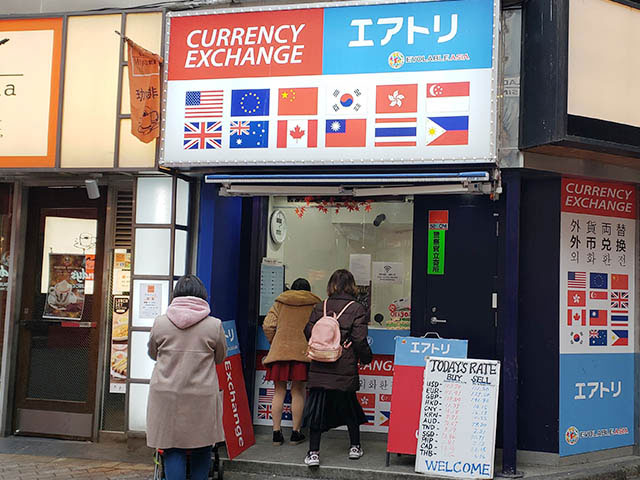Ten Tips For Comparing The Rates Of Local And Online Currency Exchange
In today's global economy, knowing the difference between online and local exchange rates is vital for those engaged in business, travel, or investment activities. Local rates are the rates provided by currency exchange outlets or banks in your locality or destination. Online rates are those provided by digital platforms or financial institutions that exchange currencies. These rates can be susceptible to major fluctuations, which can have a major impact on the cost you pay for currency exchange as well as the returns you earn from your investments. Understanding the differences between local and online rates can assist you in making better decisions, which can help you save money. Here are the top ten detailed tips on navigating the local and online rates with ease.
1. Different rates and their variations
The rates for local exchanges can vary significantly in comparison to online rates, because of overhead costs as well as market conditions. Local exchanges can charge higher fees and offer lesser favorable rates because of the operating expenses. Online platforms offer lower overheads, which can result in better rates. Understanding these distinctions can help you select the best solution to meet your exchange needs.
2. Compare Exchange Rates before Exchanging Currency
Compare the rates of online and local currency exchanges before making an informed choice. You can compare rates of currency in real-time making use of reliable websites and converter tools. For instance, you can check the rates offered by banks and currency exchange booths in your country with those available online. This will allow you to determine the most economical alternative and save money.
3. Utilize Online Currency Exchange Platforms
The online currency exchange platforms like Wise and Revolut offer competitive rates, and also charge less costs than local banks and exchange kiosks. They offer transparent fees and real-time rates. Through these services you can be assured that you are getting the best deal possible in converting currencies.
4. Be aware of the dynamic currency conversion (DCC).
If you purchase items from abroad, the option may appear to be paying with your own currency by using Dynamic Currency Conversion. Despite the convenience of this alternative, it's usually accompanied by unfavorable conversion rates and fees. Always opt to pay in the local currency to avoid excessive costs that are associated with DCC and also to benefit from lower rates.
5. Comparing Costs and Convenience Take into consideration the convenience vs.
When choosing between local or online rates, weigh the convenience and the price. Local exchanges may provide immediate access to cash that could be beneficial when traveling. However, online exchanges typically provide better rates, but require setting up an account or waiting for funds to be transferred. Consider your needs in light of your plans for travel or business needs to decide which one is best for you.
6. Track Trends in Exchange Rates
Monitoring trends in exchange rates can assist you in making an informed decision on whether to switch your currency. The online platforms usually come with historical information or analysis tools that help you monitor the fluctuation of exchange rates. By understanding the trends in the market, you can plan your transactions in currency to get the most benefit at favourable rates.
7. Compare ATM fees and local withdrawal limit
Be aware that local withdrawals may be subject to fees. Different banks might charge different fees for international transactions. ATMs typically set their own withdrawal limits. If you look up ATMs in your area before you travel, you will be able to locate ATMs with less fees and lower rates.
8. No-Fee Currency Exchange Services
A few online platforms, as well as banks, offer free currency conversion services for their customers. This can be particularly beneficial for frequent travelers or businesses which frequently deal in foreign currency. Establishing an account will allow you to enjoy low rates and superior service. This can increase your savings.
9. Consult financial experts for large transactions
Financial experts are an excellent source when you're trying to perform complex currency conversions or deal with large amounts. Currency experts are familiar with the most effective methods of managing local and online rates. This is of particular importance to companies involved in international trade as well as investors who want to minimize their exposure to foreign exchange.
10. Plan ahead to be prepared for your needs in the field of currency
If you prepare ahead it will save you time and money. Consider how much cash will be required for your trip and the most efficient method to exchange the money. If local exchange rates aren't favorable, convert your money online before you go. You'll be able to get better rates and you won't be able to lose money.
The following detailed advice for online versus local exchange rates will allow you to get through the complexity and complexities of currency conversion more effectively. Knowing the advantages and drawbacks of each choice can help you make better informed financial choices. This will eventually save you money and enhance the overall strategy for financial planning. View the best killer deal for AED to USD for website tips including pound to usd, inr to usd, rmb to usd, usd to chinese yuan, usd to cop, php to usd, chf to usd, usd jpy, currency exchange near me, swiss franc to usd and more.

Ten Tips To Help Learn About The Regulations Surrounding Rates And Exchange Of Currency
It is crucial for those travelling internationally, managing international investments or conducting business to be aware of the regulatory implications. The regulations vary greatly by country, and impact everything from currency exchange, taxation, customs duties and taxes to investment compliance and trade restrictions. Understanding the regulations is important to maximize your financial return as well as avoiding fines and making sure you are in that you are in compliance. By familiarizing with the regulatory framework it is possible to make informed choices that can enhance your travel experience, improve business operations and protect investment. Here are 10 top suggestions on how you can manage regulatory considerations effectively in your financial activities.
1. Research Visa Requirements and Requirements to enter
– Research the visa requirements and entry requirements for a new destination before you travel. Visas, entry permits and residency requirements vary between countries. Make sure you are in possession of the correct documents to avoid issues with immigration. Be aware of any changes to the regulations that might affect your ability to travel, as many countries have updated their policies in response to international events for instance, the COVID-19 epidemic.
2. Customs Regulations
– Learn the rules and regulations of the country you're going to, and be aware of the limitations on imports and exports. Every country has its own rules regarding what goods can be brought into the country without having to pay duties or taxes. If you violate these regulations, it could result in fines or confiscation of goods or even legal action. Keep in mind that many countries have you declare cash in excess of a certain amount.
3. Foreign Currency Regulations: Be informed
There are different countries that have rules that govern currency exchanges and international transfer of funds. Find out about the rules for currency exchange in the country you are visiting or doing business with, as there might be limitations on the amount you can transfer or exchange. Knowing these rules can assist you in avoiding penalties and ensure that you are in compliance with local laws.
4. Consult with local legal experts
If you're conducting business in a country that is not your own, consider consulting with local legal experts to understand the regulatory environment. You will gain valuable information regarding the laws in your country, the compliance requirements, and the potential risks. These guidelines can assist you in navigating complex regulations and prevent costly mistakes.
5. Be aware of tax obligations
Tax regulations may differ greatly between countries, which affects both business and individuals. Investigate the possible tax obligations you may be subject to if are traveling or doing business abroad, including tax on income, value-added tax (VAT) as well as withholdings from payments. Additionally, be aware of any tax treaties that exist between your country of origin and the destination country, which could affect your tax obligations.
6. Trade Regulations
If you have an enterprise that requires imports and exporting, make sure that you follow the trade regulations. This will include tariffs, import quotas and other restrictions. Infractions to the regulations could result in penalties, delays, and even delayed deliveries. Consult with a trade compliance expert to gain insight on the specific regulations that apply to your industry and products.
7. Be aware of changes in regulatory environments
– Political, economic, and/or social factors may result in rapid changes to regulatory environments. Keep yourself informed of any changes that may affect your travel, business or investments by subscribing to relevant industry newsletters, news sources or updates on regulatory issues. This proactive approach will help you adapt to the latest laws and regulations, as well as ensure that you are in the compliance of your business.
8. Investment Regulations and Investment Regulations
For investors, understanding the regulatory landscape in the countries where you plan to invest is vital. Foreign investment is governed differently in various countries. These regulations can contain restrictions on ownership, reporting requirements, or investment vehicle regulations. To avoid hefty penalties it is important to thoroughly study these regulations to make sure that your investments are compliant to local laws.
9. Use Compliance Software and Tools
– Consider using compliance software and tools to assist both individuals and companies navigate the compliance requirements. These platforms can aid in keeping track of changes in regulations, managing documentation, and ensuring the compliance of the industry's standards. Implementing tools for compliance can simplify and minimize your risk of non-compliance.
10. Engage in Local Business Networks
Establishing connections with local businesses and organisations will provide you with important information regarding regulatory issues. Joining chambers, local trade associations and other industry associations will help you make connections with professionals who are familiar with the regulatory environment. These contacts might provide advice and help in ensuring compliance with local regulations.
Utilize these suggestions to help you navigate the complexities of business travel, travel, and investment monitoring better. Knowing the regulations will enable you to make well-informed choices that are in line with your goals, ultimately improving your overall experience and your financial strategy. Understanding the regulatory environment whether you're planning a vacation, expanding your company abroad, or planning to invest overseas, will ensure that you don't make a mistake and achieve success. See the recommended CZK to EUR for website examples including usdthb, usd to pound sterling, usd to rs, rmb to usd, usd to chinese yuan, pesos to usd, pound to dollar, dollars to pounds, cad to usd, euro to dollar and more.

